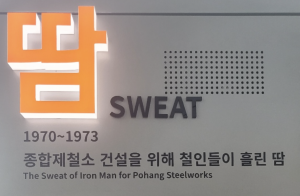Pohang: POSCO Museum
Photo essay of wall text of POSCO Museum of Pohang

Photo essay of wall text of POSCO Museum of Pohang

XXX


This essay will provide a portal into work in response to COVID-19.
This organization doesn't get involved with legislation in the regions in which they are operating. They instead focus on providing care to those affected by any number of disasters or calamities. This focus shows that they are more concerned about the immediate well-being of their patients than trying to influcence local governments to make policy changes.
As mentioned in an earlier annotation, the bibliography shows a great deal of primary and secondary sources as well as other analyses, showing that this article was produced like many other historical research peices - the author uses historical perspective to frame a period in the reader's mind, which allows them to further argue their point.
I was unable to find other pieces where this article was referenced and discussed.
I used my already existing knowledge of the UN's structure and purpose to further synthesize the role and ability of the UN Special Envoy to Haiti. I also followed up on what sort and amount of aid US AID has been giving to Haiti. From their website, I discovered that they have donated $4.2 billion to date and have assisted in improving legal protections for vulnerable populations. Finally, I followed up on the fact that at press-time, the UN had not admitted responsibility for the cholera outbreak. I found a New York Time article dated 17 AUG 16 that says they had and are making significant new actions toward improving the situation.
I'm not sure if other systems have been modeled off this one; however, it seems as though the Disaster STS network uses a similar system of annotating works in order to share their concepts and engage in discussions with others.
Andrew Lakoff is an associate professor of anthropology, sociology, and communication at the University of Southern California, Berkeley. He expertise lies in the anthropology of science and medicine and the implications of biomedical innovations. He does not appear to be professionally situated in emergency response. He has only written on book on a macro scale titled, "Disaster and the Politics of Intervention," but he appears to have no further association or expertise in the field.
Stephen J. Collier is the chair of the Graduate Program in International Affairs at the New School in New York City. He is an expert in economic regulation, social welfare, and emergency management in Russia, the Republic of Georgia, and in the United States. He is currently researching the emergence of vital systems security in disaster policy, homeland security, and infrastructure protection. In this manner, he is related with emergency response. He also has a number of publications listed on his CV in relation to disaster response.